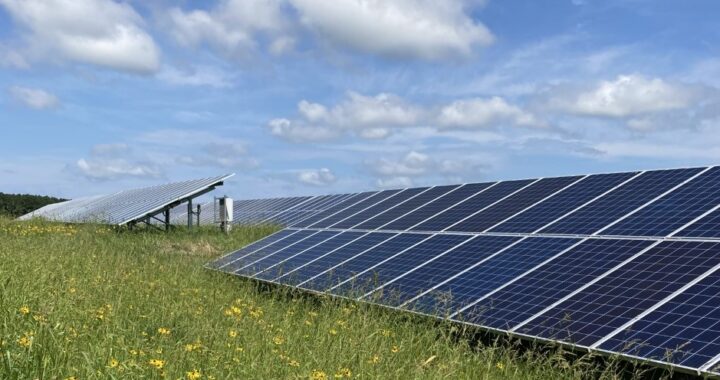In partnership with The Bee and Butterfly Habitat Fund, Maryland Department of Natural Resources, contractor Evan Miles with Bluestem Farms, and U.S Fish and Wildlife Service Chesapeake Bay Field Office, 16 acres of pollinator habitat were installed between and around the 204 solar array panels at the Easton Sustainability Campus. “We are delighted to help create something so resourceful in an already environment friendly location,” stated Doug Abbott, Water & Wastewater Department Manager for Easton Utilities.
The solar pollinator habitat represents an exciting opportunity to efficiently use land around renewable energy by creating habitat for wildlife, birds, and pollinators. Beyond habitat benefits, native species and naturalized species such as clover have a host of other benefits on the local ecosystem which includes improving soil health, better stormwater retention, and reducing on site temperatures underneath panels which can increase the efficiency of energy capture on a hot summer’s day. Additionally, pollinator habitat requires less maintenance than grass and can represent a huge cost savings for utility companies, while also reducing environmental impact.
Maryland Department of Natural Resources recently established a solar pollinator scorecard which gives qualifying solar sites a pollinator friendly certification, in hopes of establishing more pollinator solar sites around Maryland. This concept has had much success in midwestern states where solar pollinator habitat is more common. The Bee and Butterfly Habitat Fund is a nonprofit that seeks to implement solar pollinator habitat first in the mid-West and has most recently expanded into the mid-Atlantic. This organization generously donated seed for this project and offered technical advice.
Katherine Stahl and Rich Mason with US Fish and Wildlife Service worked closely with all partners to maintain best practices for implementation while working with Easton Utilities. Easton Utilities looks forward to a continued partnership for many other conservation projects at the sustainability campus, and with other local solar providers to install more pollinator habitat.

